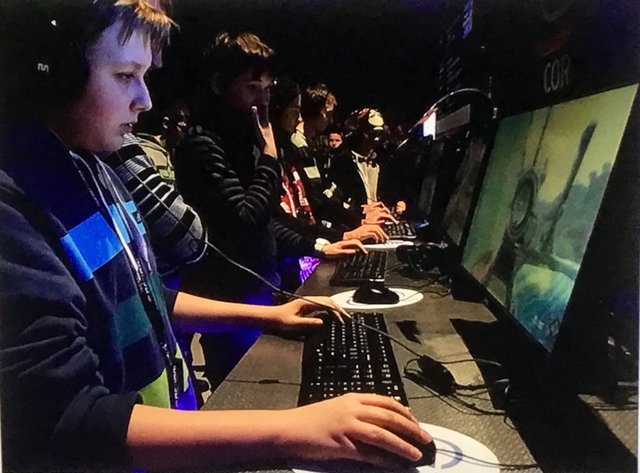What Videogames Teach Us About Work
WHAT VIDEOGAMES TEACH US ABOUT WORK
Videogames have been featuring in the news recently. BBC Radio 4 is running a half-hour programme about Fortnite and in an article written for i by Will Tanner, it was reported that a Universal Basic Income experiment was ended because “ministers refused to extend its funding amidst concern that young teenagers would stay at home and play computer games instead of looking for work”.

(Image from wikimedia commons)
That argument had a tone that is sadly familiar, depicting videogaming as an addictive evil that distracts its victims from what they ought to be doing. But I think it would be more accurate to say that gamers have already found meaningful work and are reluctant to forsake it and submit to less rewarding labour instead.
This way of looking at it goes largely unrecognised because we are not taught to equate videogaming with work. Instead, you ‘play’ a videogame and we are raised to believe that play is childish, a distraction, mere fun. Play, we are encouraged to believe, is the opposite of work.
But it really isn’t. One only has to look at the play other animals engage in to see there is a serious side to it. It’s a way of honing skills that will become essential in later life.

(Animals at play. Image from wikimedia commons)
Similarly, in videogaming we find many activities that can be seen to hone skills that are important in this digital age we live in. Authors Bryon Reeves and J. Leighton Read list over a hundred such activities, including:
“Getting information: Observing, receiving and otherwise obtaining information from all relevant sources.
Identifying information by categorising, estimating, recognising differences or similarities and detecting changes in circumstances and events.
Estimating sizes, distances and quantities or determining time, cost, resources, or materials needed to perform a work activity.
Thinking creatively: developing, designing or creating new applications, ideas, relationships, systems or products, including artistic contributions”.
Also, in an article written for ‘Wired’ (“You Play World of Warcraft? You’re Hired!”) John Seely and Douglas Thomas explain how “the process of becoming an effective guildmaster amounts to a total-immersion course in leadership...to run a large one, a guild master must be adept at many skills: attracting, evaluating and recruiting new members; creating apprenticeship programs; executing group strategy...these conditions provide realworld training a manager can apply directly in the workplace”.
Far from being a distraction from work, videogames are, along with jobs, one of modern life’s two main work providers. Instead of lending support to the idea that people don’t want to work, videogames demonstrate how eager we are to engage in productive activity, to reach for goals, to solve problems and to take part in collaborative projects.
It does, however, raise a question: How come one work provider is able to draw upon willing and eager volunteers, while the other (jobs) mostly creates a feeling that work is a necessary evil you wouldn’t do if you had a choice? And, yes, that is how a great many people feel, as revealed by polls that show ninety percent of people hate their jobs.
Fundamentally, I think it all has to do with the direction in which money flows, and how that affects the design of work in videogames and jobs.
What do I mean by the direction in which money flows? Quite simply, I mean that if you have a job, then, assuming you are not an unpaid intern, a company will be paying you to work. This means that you are both an investment and a cost. On the other hand, when it comes to videogames, you pay a company to work, since you have to first purchase the game (and even if it is free-to-play like Fortnite, the company will have some means of extracting money from you). This means that you represent almost all profit, and only negligible cost.
Because videogame publishers want as many people to spend money on their games as possible, it obviously makes sense if working in a gaming context is as enjoyable and rewarding as it can be. When it comes to making work engaging, productive activity should provide opportunity to pursue mastery; it should offer autonomy, flexibility, judgement and creativity that is firmly in the hands of the individual doing the actual work.
The best videogames are great at providing all these conditions. Autonomy and flexibility are found in games where you don’t have to tackle challenges in a strictly linear fashion but can forge your own path instead. For example, in ‘Batman: Arkham Knight’ you, as the Caped Crusader, are free to roam Gotham City, swooping down to fight crime as and when you find it. If you hear an alarm ringing, you can locate its source and do a sub-mission involving a bank robbery. If you see smoke you can attempt to arrest Firefly. Exactly how you get to the game’s finale is entirely up to you.

(Image from Rocksteady)
Many games offer creativity, providing opportunities to customise the look of your character or items you have acquired. Some games come with comprehensive editing tools that offer even more scope for creative expression, such as ‘LittleBigPlanet’ which goes as far as enabling players to create whole new games. And since their very inception, videogames have given us the chance to exercise our judgement and gain mastery, as we make the snap decisions required to advance up the high-score charts, helped by well-crafted feedback systems that informs us when we are doing well and when we should try alternative strategies.
Now, it’s true that jobs may also provide the things that make work worthwhile. But, the crucial difference is that, where videogames are concerned, there is never a good reason to try and reduce or eliminate such qualities. Doing so would only make for a bad game that nobody would choose to play. There is, however, a reason why employers might want to reduce such qualities in a job. There is something that unites these qualities, which is that they all help to enhance our individuality. That’s not something that employers necessarily desire. The more creativity, judgement, and autonomy can be reduced on an individual level, the easier it becomes to train new recruits. Indeed, in many ways it’s preferable if your employees are less like unique individuals and more like interchangeable units that can be replaced at as short a notice as possible. The reason why that’s advantageous is because it reduces the bargaining power of the workforce, since you are less likely to complain about pay and working conditions if you know it won’t be too difficult for the boss to fire and replace you.
The result? A cheaper workforce, more value extracted from the commodity of labour-power, and more profit for those the labourers work for. You have to bare in mind that employees are quite low down in the pecking order for rewards from the labour process. Governments want their cut, banks and financial services want their cut, the company executives want their cut, and they take priority over the working classes, kind of like how the more powerful predators and scavengers get the juicy meat and leave only scraps for the rest to fight over. When it comes to the pursuit of more profit, it pays to make work as unrewarding (in a monetary sense) as you can get away with, which often results in work being designed to be as unrewarding (in the sense of not being engaging) as possible.

(Image from wikimedia commons)
“But why would people choose to do work designed to be lacking the very qualities that make it engaging?”, you might be asking. The answer can be found in ‘negative motivation’. Being without a job can have serious consequences. Cut off from an income, bills cannot be paid and the threat of rough sleeping looms ever closer. On top of that there is cultural pressure to ‘get a job’, so much so that we don’t care if the job is useless or even harmful to society (‘at least s/he has a job’). This all amounts to enormous pressure to submit to employment, not really because of the gains people expect if they do have a job, but rather because of the punishment they dread if they don’t.
Videogame companies, on the other hand, cannot rely on negative motivation for the simple fact that hardly anyone can be forced to play games (I say hardly anyone, because there are sweatshops in which people grind through MMORPGS to level up characters that can be sold on to richer customers). This further emphasises the point that videogames never have an incentive to make work less rewarding, whereas such incentives do exist in the world of jobs.
CONCLUSION
Videogames, far from demonstrating our distaste for work, in fact show how willing and eager to work we are. So willing, in fact, that our desire to work supports one of the most successful industries of the modern age. Every day, millions of us spend billions all so we can engage in the work videogaming requires. If we really hated work, the first person to put a quarter into the first arcade game would have walked away in disgust at having to pay to stand there and perform repetitive manual labour. What, are you crazy?
What videogaming shows instead is that if you can take that simple mechanical operation and craft around it creativity, flexibility, autonomy, judgement and mastery, the result is work that people want to do so much they will gladly pay for it. But if, in the interest of extracting more value for money out of your workforce, you reduce or eliminate such qualities, people will hate such work and will only submit to it if circumstances force them.
That’s what jobs teach us.
REFERENCES
‘Wired’
‘Total Engagement’ by Bryon Reeves and J. Leighton Read.
‘Why We Work’ by Barry Schwartz.
Hi extie-dasilva,
Visit curiesteem.com or join the Curie Discord community to learn more.
This was well done.
Haha I am always a bit shocked to still see authorities point to video games and talk about them like they are heroin or something lol.
Anyway, I really think that you are onto something here:
"This all amounts to enormous pressure to submit to employment, not really because of the gains people expect if they do have a job, but rather because of the punishment they dread if they don’t."
I find that most employers want submissive workers because they are easier to exploit and mistreat. For them or the people who support them, the type of freedom and engagment things like games provide is a scary thing I think.
Videogames sure do teach alot, instead of finding ways to eliminate them completely we can learn to channel those great lessons to our jobs. But the sad thing is that the job can never really be that fun.
A gamer isn't lazy, He, infact is hardworking. But there are a whole lot of things that need to made right in our working environment in order for people to be able to function effectively. And equally be productive, creative and work enthusiastically.
Nice article!
I love this. I think video games actually help to develop some part of us-creativity and teamwork among others as you mentioned.
This article really fascinated me! I have never considered video games in this way -
This is incredibly salient! My achievement hunting is viewed on a whole new level! Human beings are incredibly collaborative and goal-oriented, if only we could restructure employment to suit!
In fact, I think a future society built around abundance would take this into full account. This article has left me with so much to think about, I am going to resteem it to lock a link to it into my blog permanently.
Thank you for sharing this with us on Steem!
This post tackles my usual rants with the current way the corporate jobs work. I used to be a call center agent and dang, everyday is like a drag in hell. My creativity dwindles as the days go by and the "fun rooms" (rooms with games) are hardly ever used because of the compressed work schedule. If everything were structured like a game, as what I read from fun theory, then maybe employees would be a bit more efficient at their jobs.
But it's difficult to introduce innovations when most of the superiors are traditionalist afraid of changes. Your post was insightful and it reflects the reality of how gamers may perceive the real world work outside gaming industry.
I think you may have a point there. I remember at one point I came home and played the simms every day. After a while I stopped because it was getting way too much like real life work.
Same thing with Farmville repetition of routine tasks for rewards.
If you think about it Steemit is the same way. We post and comment and collect sp points and rep score then do it all again.